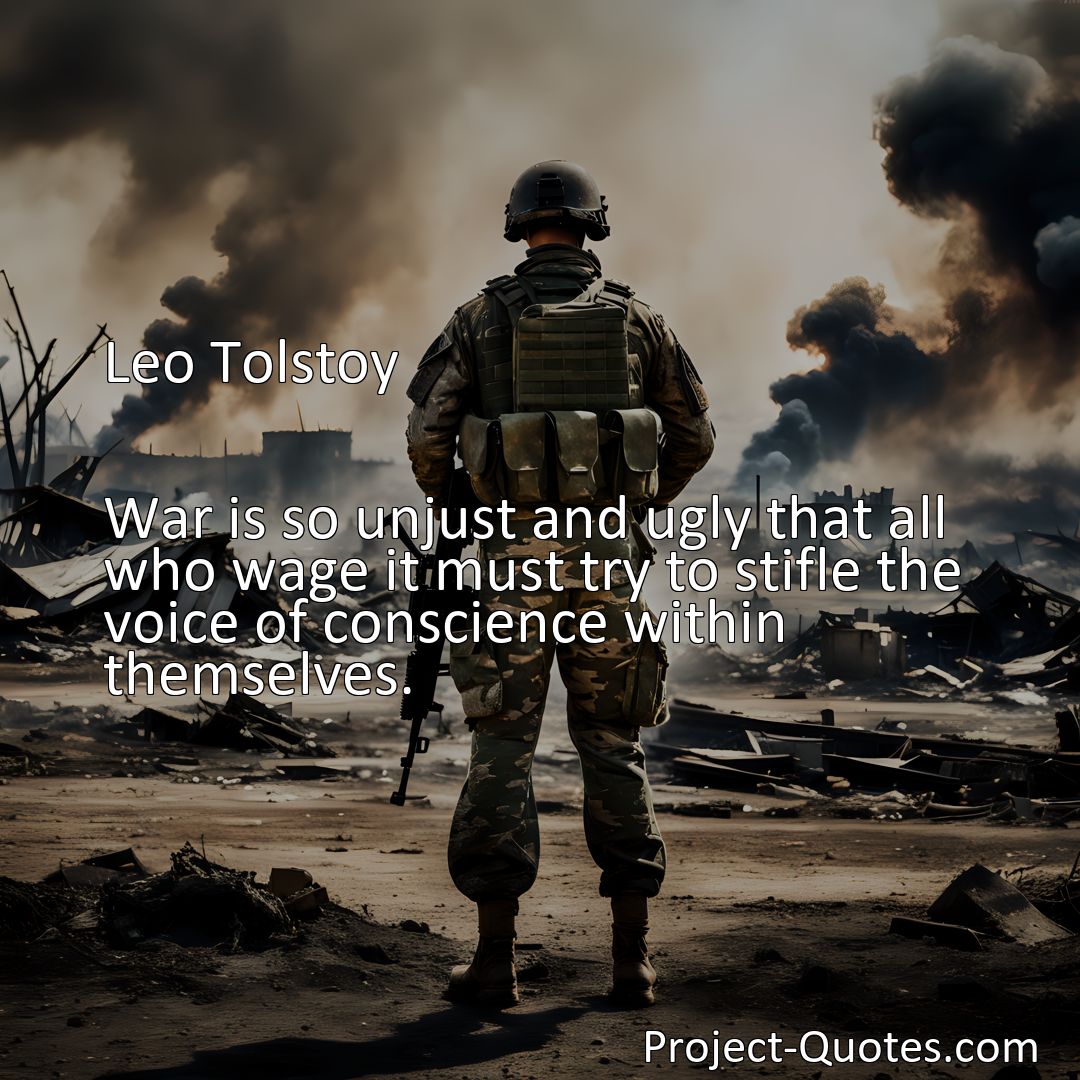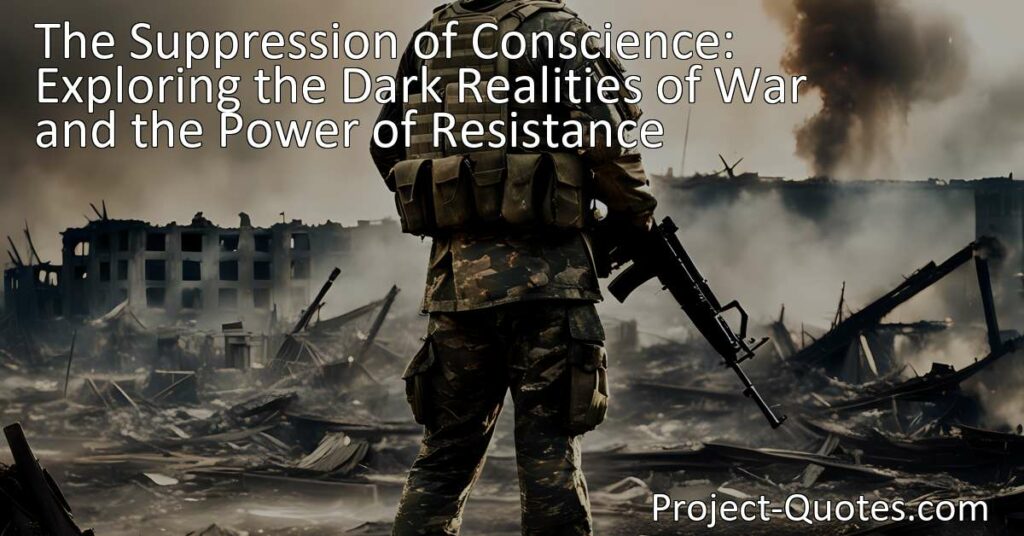War is so unjust and ugly that all who wage it must try to stifle the voice of conscience within themselves.
Leo Tolstoy
The Suppression of Conscience: Exploring the Dark Realities of War and the Power of Resistance delves into the reasons why people participate in war and how they must stifle their inner voice of empathy and compassion. This suppression of conscience is achieved through dehumanization, propaganda, and societal pressure. However, throughout history, individuals like Gandhi and Martin Luther King Jr. have refused to silence their conscience, inspiring others to resist violence and seek peaceful resolutions.
Table of Contents
Meaning of Quote – War is so unjust and ugly that all who wage it must try to stifle the voice of conscience within themselves.
War is a subject that often invokes a whirlwind of emotions, ranging from anger and sadness to frustration and despair. Throughout history, countless lives have been lost, families torn apart, and communities destroyed as a result of armed conflicts. It is an undeniable truth that war is one of the most unjust and ugly aspects of human existence. In the face of such darkness, individuals who choose to engage in warfare find themselves needing to silence the voice of conscience within themselves.
To fully understand the implications of this quote, it is important to delve into the nature of war and explore the reasons why people participate in such horrific acts. War is not a simple black and white scenario; it is a complex tapestry woven from a myriad of factors. The reasons for entering into conflicts can vary greatly, including territorial disputes, ideological differences, or simply a desire for power and dominance. Whatever the root cause may be, war is ultimately driven by a deep-rooted human nature that seems to revel in violence and destruction.
However, despite this seemingly innate propensity for violence, individuals must find a way to justify their actions in order to cope with the immense guilt and moral dilemmas that arise. This is where the stifling of the voice of conscience becomes crucial. Those who wage war often find themselves trying to silence the persistent inner calling for empathy and compassion. It is a mechanism that allows them to detach from the suffering and devastation they inflict upon others.
Throughout history, various psychological and sociological theories have attempted to explain this phenomenon. One such theory suggests that humans have a natural tendency to dehumanize their enemies during times of war. By viewing the opposing side as less than human, it becomes easier to justify acts of violence and mitigate feelings of guilt. Words such as “enemy,” “threat,” and “other” are used to create a sense of separation, reinforcing the false belief that the suffering caused by war only affects a faceless and distant entity. In doing so, the voice of conscience is suppressed and the horrors of war become more bearable.
Moreover, the pressure to conform to the expectations of society also plays a significant role in stifling the voice of conscience. Nations at war often employ propaganda to manipulate public opinion and foster a sense of unity and unwavering support for the cause. This propaganda paints an idealized version of the enemy as evil, dangerous, and deserving of defeat. By presenting a one-sided narrative, it becomes easier for individuals to silence their own doubts and convictions, succumbing to the collective mindset that justifies their participation in war.
Unfortunately, the suppression of the voice of conscience is not limited to those directly involved in warfare. It extends to the general populace as well. In times of conflict, societies tend to rally behind their leaders and unquestioningly support their decisions. Dissent and criticism are silenced under the guise of patriotism and a shared goal of preserving national interests. This collective denial of the moral ramifications of war leads to the further stifling of conscience, perpetuating the cycle of violence.
Nevertheless, it is important to recognize that the voice of conscience can never truly be extinguished. Despite attempts to drown it out, it continues to whisper in the depths of the human soul, gently urging individuals to question their choices and consider the devastating consequences of war. Throughout history, there have been countless examples of individuals who have refused to stifle this voice and have gone against the grain, speaking out against war and advocating for peaceful resolutions.
One such example is the renowned pacifist Mahatma Gandhi, whose principles of non-violence and passive resistance achieved monumental success in the Indian independence movement. Gandhi believed that violence only begets more violence and that true strength lies in peaceful resistance. By refusing to stifle his voice of conscience, he inspired millions and proved that there is an alternative path to conflict resolution.
Similarly, the voice of conscience echoed through the works of Nobel Peace Prize laureate and human rights advocate Martin Luther King Jr. His belief in the power of love, justice, and non-violence transformed the civil rights movement in the United States. Despite facing opposition, King never wavered in his commitment to peaceful protest and used his voice to rally others against the injustices of the time.
In the same vein, the voice of conscience finds a powerful expression in art and literature. Countless authors, poets, and painters have used their creative endeavors to shed light on the horrors of war and challenge society’s acceptance of violence. Through their works, they evoke empathy, compassion, and a sense of shared humanity, provoking individuals to question the actions they have taken or supported.
To stifle the voice of conscience within oneself is to deny the very essence of our shared humanity. While war may seem like an inescapable part of our world, it is essential to remember that it is a man-made concept. It is built upon a foundation of fear, hatred, and power struggles. Each individual has the capacity to resist this perpetuation of violence and actively work towards peace, both within themselves and in the world around them.
In conclusion, war is undeniably unjust and ugly, leaving a trail of devastation in its wake. It is a grim reality that those who wage war are compelled to stifle the voice of conscience within themselves. However, the persistence of this voice cannot be fully silenced. Throughout history, individuals have emerged who have refused to succumb to the pressures of war, using their voices to advocate for peace and challenge the prevailing narrative. It is through these examples and the recognition of our shared humanity that the voice of conscience can regain its strength, making way for a world that seeks harmony and compassion rather than violence and destruction.
I hope this quote inspired image brings you hope and peace. Share it with someone who needs it today!


